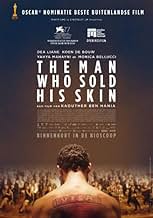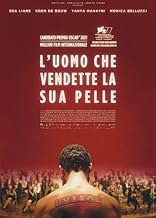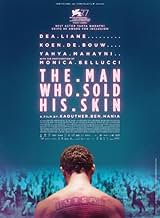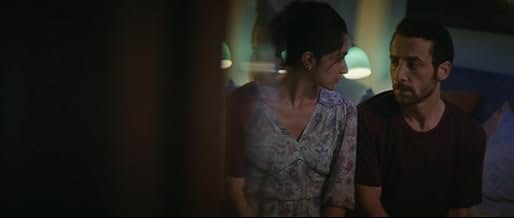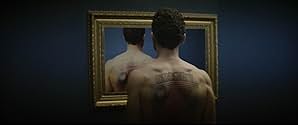IMDb RATING
6.9/10
7.5K
YOUR RATING
His own body turned into a living work of art and promptly exhibited in a museum, Sam, a Syrian refugee, will soon realize to have sold away more than just his skin.His own body turned into a living work of art and promptly exhibited in a museum, Sam, a Syrian refugee, will soon realize to have sold away more than just his skin.His own body turned into a living work of art and promptly exhibited in a museum, Sam, a Syrian refugee, will soon realize to have sold away more than just his skin.
- Nominated for 1 Oscar
- 9 wins & 12 nominations total
Koen De Bouw
- Jeffrey Godefroi
- (as Koen de Bouw)
- Director
- Writer
- All cast & crew
- Production, box office & more at IMDbPro
Featured reviews
Greetings again from the darkness. Lao Tzu wrote, "Being loved deeply by someone gives you strength, while loving someone gives you courage." But to what extreme would you go for true love, and how far is too far? Writer-director Kaouther Ben Hania offers an early scene on a commuter train as Sam Ali and Abeer flirt and tease to the point that he publically, and loudly, proclaims his love for her. Unfortunately for him, his outburst occurs in Syria, where human rights are always in peril. In fact, this love story is burdened with the weight of human rights, individual choices, and the power of art.
Ms. Ben Hania bookends her film with a choreographed art installation coated in a blizzard of white walls and white gloves. It's 2011, when a distant relative in law enforcement assists Sam Ali (Yahya Mahayni) with his (quite creative) escape from Syria to Lebanon - after a painful slap of reality accompanies Sam's goodbye to his beloved Abeer (Dea Liane in her first screen credit). As Sam flees for his life, Abeer is pressured by her family into an arranged marriage.
We then flash forward one year to find Sam working in a Beirut chicken factory. He scrounges for food at the buffet of local art galleries until one day he is spotted by Soraya (a blond Monica Bellucci), the agent for acclaimed artist Jeffrey Godefroy (Koen De Bouw). When Sam and Godefroy meet, the artist tells him that art is "alive" and, more precisely, "I want your back". A Faustian deal is cut. Godefroy turns Sam Ali into a living piece of art by tattooing his back, and Sam gets the travel visa he desperately needs to reunite with Abeer.
With Sam basically a commodity (there are even T-shirts of his back in the gift shop), there are protests to his being exploited - this despite Sam enjoying the nice hotels, room service, and promise of the visa. Of course, as with any commodity, it's only a matter of time before the almighty dollar comes into play, and soon Sam is auctioned off to a collector. Subtle humor has a role throughout much of the film, and Mr. Mahayni is quite believable as a Syrian refugee sacrificing for love. Ms. Ben Hania's film is inspired by "Tim", an original artwork tattoo by Wim Delvoye sold to a collector in 2008. Mr. Delvoye, a controversial Belgian artist, even makes a brief appearance here as an insurance agent. This is a thought-provoking love story, survival tale, and commentary on the bent side of the art world. When is a man truly free? We don't typically think of Tunisia as a hotbed for cinema, but this film deserves attention.
Ms. Ben Hania bookends her film with a choreographed art installation coated in a blizzard of white walls and white gloves. It's 2011, when a distant relative in law enforcement assists Sam Ali (Yahya Mahayni) with his (quite creative) escape from Syria to Lebanon - after a painful slap of reality accompanies Sam's goodbye to his beloved Abeer (Dea Liane in her first screen credit). As Sam flees for his life, Abeer is pressured by her family into an arranged marriage.
We then flash forward one year to find Sam working in a Beirut chicken factory. He scrounges for food at the buffet of local art galleries until one day he is spotted by Soraya (a blond Monica Bellucci), the agent for acclaimed artist Jeffrey Godefroy (Koen De Bouw). When Sam and Godefroy meet, the artist tells him that art is "alive" and, more precisely, "I want your back". A Faustian deal is cut. Godefroy turns Sam Ali into a living piece of art by tattooing his back, and Sam gets the travel visa he desperately needs to reunite with Abeer.
With Sam basically a commodity (there are even T-shirts of his back in the gift shop), there are protests to his being exploited - this despite Sam enjoying the nice hotels, room service, and promise of the visa. Of course, as with any commodity, it's only a matter of time before the almighty dollar comes into play, and soon Sam is auctioned off to a collector. Subtle humor has a role throughout much of the film, and Mr. Mahayni is quite believable as a Syrian refugee sacrificing for love. Ms. Ben Hania's film is inspired by "Tim", an original artwork tattoo by Wim Delvoye sold to a collector in 2008. Mr. Delvoye, a controversial Belgian artist, even makes a brief appearance here as an insurance agent. This is a thought-provoking love story, survival tale, and commentary on the bent side of the art world. When is a man truly free? We don't typically think of Tunisia as a hotbed for cinema, but this film deserves attention.
A desperate man on the run from Syria, sells his back as a canvas for an eccentric artist. He sits as a display for audiences at galleries and museums. His girlfriend Has moved to Belgium with her new husband. He is well paid but has doubts about his choice. The story uses a real life situation where a man sold his skin to an artist. The movie was nominated for an Oscar and I rank it just below A Better Life in the foreign film category.
I hadn't realised that was by a Tunisian director. She did a good job to get Syrians to play nearly all of the principal parts. It really irritates me when the accents don't match the supposed country when I watch an Arabic-language film and I always wonder why so many films make do with impersonations. I used to live in Syria, so it is even worse when the actors are playing (and failing) the various Syrian accents.
I was also pleased to see that there was very little propaganda against His Excellency Bashar al-Assad, the elected President of Syria. He was referred to as a dictator at one point; I wish the translation on the subtitles had said "Autarch" which might have been better. However, despite the freedoms experienced by Syrians before the attack on her, the results of the scene in the train during the marriage proposal and its subsequent sequels are wearily familiar as were the family connections used as a solution.
Life as a refugee was shown unflinchingly. I have had experience of some of the tricks and strategies used by migrants to stay alive - I live in a different Arab country now and see sub-Saharan immigrants at exhibitions where food will be served so they can get a meal for free just as Sam and his friends do in the film.
It's at one of these exhibitions that Sam's life changes. He makes a pact that will allow him to follow his love to Europe to fulfil a promise and a dream. He has contracted out his body.
Not everything goes smoothly, of course. There wouldn't have been a film if it had. That the hour and forty four minutes flew past is a testament to the power of the storyline and plot development. The last two twists in the final minutes of the film had me in the depths of despair; I'd seen the first one coming. What else would DAESH had done? There's another development after that which resolves the film completely.
I had had this waiting to be watched for a month or so. Last night was an ideal time to watch; I was relaxed and ready for it. I recommend the film.
I was also pleased to see that there was very little propaganda against His Excellency Bashar al-Assad, the elected President of Syria. He was referred to as a dictator at one point; I wish the translation on the subtitles had said "Autarch" which might have been better. However, despite the freedoms experienced by Syrians before the attack on her, the results of the scene in the train during the marriage proposal and its subsequent sequels are wearily familiar as were the family connections used as a solution.
Life as a refugee was shown unflinchingly. I have had experience of some of the tricks and strategies used by migrants to stay alive - I live in a different Arab country now and see sub-Saharan immigrants at exhibitions where food will be served so they can get a meal for free just as Sam and his friends do in the film.
It's at one of these exhibitions that Sam's life changes. He makes a pact that will allow him to follow his love to Europe to fulfil a promise and a dream. He has contracted out his body.
Not everything goes smoothly, of course. There wouldn't have been a film if it had. That the hour and forty four minutes flew past is a testament to the power of the storyline and plot development. The last two twists in the final minutes of the film had me in the depths of despair; I'd seen the first one coming. What else would DAESH had done? There's another development after that which resolves the film completely.
I had had this waiting to be watched for a month or so. Last night was an ideal time to watch; I was relaxed and ready for it. I recommend the film.
"The Man Who Sold His Skin," Tunisia's first ever International Feature Film nominee at the Academy Awards, reminded me a lot of the movie "Synonyms" from last year. Both are about men who have been exiled from their countries of origin -- in one the man is a Syrian refugee, in the other a young man self exiles himself from the oppressive military culture of Israel. In both films, the men find themselves turned into commodities by their adopted countries, welcomed only as much as they can prove themselves to be useful. I liked both films quite a lot, "Synonyms" probably a bit more, but "The Man Who Sold His Skin" is quite good in its own right.
It's apparently based on a true story, though I always take that claim with a grain of salt. The man at the film's center agrees to have his entire back tattooed with a visa that allows refugees to travel freely through Europe, which turns him into a living work of art on display in museums and galleries. The lack of narrative subtlety is compensated for by a striking visual style. This film looks beautiful, nearly every scene offering the viewer composition just begging to be admired. Indeed, at times it's almost a little too beautiful, too carefully composed, as if the director just couldn't help but make choices that would draw attention to themselves. But it's a sin I can forgive when the results are a movie that looks as good as this one does.
Grade: A.
It's apparently based on a true story, though I always take that claim with a grain of salt. The man at the film's center agrees to have his entire back tattooed with a visa that allows refugees to travel freely through Europe, which turns him into a living work of art on display in museums and galleries. The lack of narrative subtlety is compensated for by a striking visual style. This film looks beautiful, nearly every scene offering the viewer composition just begging to be admired. Indeed, at times it's almost a little too beautiful, too carefully composed, as if the director just couldn't help but make choices that would draw attention to themselves. But it's a sin I can forgive when the results are a movie that looks as good as this one does.
Grade: A.
The Man Who Sold His Skin is a pretty good movie. And it's one about art that to an extent shares my feelings and opinions of it. Meaning, that I was naturally inclined to like it as soon as I understood what was going on... And I did.
But the movie comes with its own collection of flaws that are a little too big to miss. The greatest complaint I have is that the movie overall seemed aimless. Aimless in that there was no one destination the writers felt comfortable diving deep into. Rather, the movie keeps itself safe on the surface; often finding itself at the door of a sophisticated and thought provoking conflict, but hesitates entering or engaging with those questions. Another minor complaint is the ending; which after all what the movie has been about, felt a little too cheesy.
Overall, I like what the movie is about, and I'm glad I watched it. The complaints I have are not too great to prevent one from enjoying the movie.
But the movie comes with its own collection of flaws that are a little too big to miss. The greatest complaint I have is that the movie overall seemed aimless. Aimless in that there was no one destination the writers felt comfortable diving deep into. Rather, the movie keeps itself safe on the surface; often finding itself at the door of a sophisticated and thought provoking conflict, but hesitates entering or engaging with those questions. Another minor complaint is the ending; which after all what the movie has been about, felt a little too cheesy.
Overall, I like what the movie is about, and I'm glad I watched it. The complaints I have are not too great to prevent one from enjoying the movie.
Did you know
- TriviaWhile director Kaouther Ben Hania was visiting the Louvre Museum in Paris in 2012, there was a retrospective of Belgian artist Wim Delvoye. There she saw, in Napoleon III's apartments, Delvoye's Tim (2006 - 08), in which the artist had tattooed the back of Tim Steiner, who was sitting on an armchair with his shirt off displaying Delvoye's design. The piece was sold to a German art collector and Tim is contractually obliged to spend a certain amount of time, topless and sitting still, in a gallery every year. Wim Delvoye appears in the movie as the insurance guy.
- GoofsWhen Sam Ali changes his seat at the train at 05:55, the place of the man in the back seat changes each time the camera switches between Sam and Abeer.
- ConnectionsFeatured in La 93e cérémonie des Oscars (2021)
- SoundtracksFiliae maestae Jerusalem, RV 638: I, 'Filiae maestae Jerusalem'
Music by Antonio Vivaldi (uncredited)
Conducted and Performed by Philippe Jaroussky (Audio) (p)
Performed by Ensemble Artaserse (uncredited)
2014 Erato/Warner Classics, Warner Music UK Ltd.
- How long is The Man Who Sold His Skin?Powered by Alexa
Details
- Release date
- Countries of origin
- Official sites
- Languages
- Also known as
- The Man Who Sold His Skin
- Filming locations
- Production companies
- See more company credits at IMDbPro
Box office
- Budget
- €2,230,000 (estimated)
- Gross worldwide
- $227,290
- Runtime1 hour 44 minutes
- Color
- Sound mix
- Aspect ratio
- 2.39 : 1
Contribute to this page
Suggest an edit or add missing content



